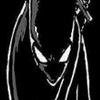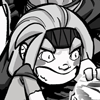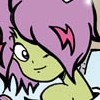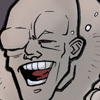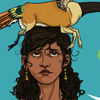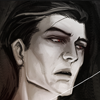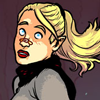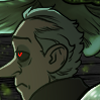Monthly Archives: August 2010
The Webcomic Overlook #133: Another Videogame Webcomic

Despite playing some of the most popular video game franchises in history, very few of my most played games will ever make their way into a video game comic. Why? For the simple fact that they’re sports games. I played the hell out of the SSX games, the Midnight Club racing game and its sequels, three iterations of the WWE Smackdown series, the Madden football series, and various NHL games from both EA and 2K Sports. Yet, outside of the token “Madden is the same game this year as it is last year” joke, you’ll never see any of them mentioned in a video game webcomic.
Some of this, I think, can be chalked up to the sniffy, dismissive attitude gamers — and by that I mean specifically the ones devoted to first-person shooters, fighting games, and Mario — have toward sports games in general. (Never mind that players of Madden and SSX are technically gamers as well.) Oh, do I wish you could have been there to see the drama unfold when SSX 3 made the AV Club’s Best of the Decade list!
Or maybe it’s just not easy to make jokes about sports games where the playable characters are either real life personalities or anonymous avatars rather than something as well defined fictional creations like Master Chief, Cloud, and Sonic the Hedgehog. (I’d argue that this still isn’t true with the case of SSX, as the little fan community that clustered around the Merqury City site can attest.)
If there’s something I can respect about Phil Chan and Joe Dunn’s self-effacingly titled Another Videogame Webcomic, it’s their almost quixotic devotion to doing jokes about games that don’t typically get featured in a video game webcomic. Oh sure, we’ll get plenty of Bioshock and Bayonetta jokes. But we’ll also get some jokes about Madden and … Iron Chef America: Supreme Cuisine? The Grey’s Anatomy game?
… huuuuuuuhhhhh?

And Your Winner for the 2009 Harvey Award for Best Online Comics Work…
… is PvP by Scott Kurtz. The webcomic beat out several worthy contenders, including:
- HARK! A VAGRANT, by Kate Beaton — a Webcomic Overlook favorite; when’s someone finally going to hand her an award, people?
- HIGH MOON, by Steve Ellis, David Gallaher and Scott O. Brown — which is also good, but won the award last year.
- POWER OUT, by Nathan Schreiber — reviewed here, and, along with Sin Titulo, was also an Eisner nominee.
- SIN TITULO, by Cameron Stewart — which would probably have been my favorite to win the thing based on Cameron Stewart’s name alone. Good thing I don’t keep track of the Harveys, huh? I would’ve looked pretty silly.
The awards, which coincidentally were also being emceed by Scott Kurtz, were presented at the Baltimore Comic-Con. Kurtz joins a very short list of Online Comic winners, which include James Kochalka (American Elf), two-time winner Nicolas Gurewitch (Perry Bible Fellowship), and the High Moon guys.
As for the other webcomic-related nominations, the Act-I-Vate Primer was up for Best Anthology, but lost out to DC’s Wednesday Comics. A.D.: New Orleans After The Deluge lost the Best Previously Published Graphic Novel Award to Image Comic’s Mice Templar. Jenny Frison of The Dreamer, which has been nominated at the Harveys before, was up for Best Cover Artist, but lost to Hellboy (but, let’s face it, it’s hard to beat Mike Mignola). Steve Ellis was in the running for Best Inker for High Moon, but came runner up to Klaus Janson (The Amazing Spider-Man). Finally, Rob Guillory took home the Best New Talent award for Chew, which meant that Nathan Schieber of Power Out had to settle for the “Nominated for Best New Talent” title.
All in all, not a bad year for webcomic recognition at the Harveys. Still, if the nominations handed out this year and last year are any indication, there’s a movement toward something we can now call established brands: several multiple nominations for Zuda Comics, Act-I-Vate, and Transmission-X. Transmission-X has now established itself as a formidable brand with the Shuster and Eisner Awards going to Sin Titulo.
Despite the High Moon win last year, the Harveys seem to be leaning toward gag-a-day strips while the Eisner seems to be favoring long-form webcomics. It might be some time before either award recognizes short-form and long-form as two fundamentally different genres, but at least we seem to have a clear division regarding the nature of the awards themselves.
(h/t Robot 6)
The Webcomic Overlook #132: Nathan Sorry

There’s been a lot of scary hullabaloo in the media lately asking “What is it about 20-somethings?“, i.e. “How come my unemployed, lazy-ass kids are turning 30 and still living in my basement?” Seriously, my wife turned on the TV this morning, and that’s what they were talking about on the Today Show.
The argument boils down to the idea that 20-somethings are afraid of growing up. Now, I personally believe that a lot of this is the typical sensationalist media panic. When I was but a young El Santo, I remember being handed a similar article by my dad from the Reader’s Digest entitled “The Lazy American Teenager.” I imagine my dad afraid I was turning into a burnt out teen. (Guilty as charged!)
But, for the sake of putting together an intro for this here webcomic review, I’m going to go ahead and take this humbuggery seriously. Here’s a quote form the New York Times:
DURING THE PERIOD he calls emerging adulthood, Arnett says that young men and women are more self-focused than at any other time of life, less certain about the future and yet also more optimistic, no matter what their economic background. This is where the “sense of possibilities” comes in, he says; they have not yet tempered their idealistic visions of what awaits. “The dreary, dead-end jobs, the bitter divorces, the disappointing and disrespectful children . . . none of them imagine that this is what the future holds for them,” he wrote. Ask them if they agree with the statement “I am very sure that someday I will get to where I want to be in life,” and 96 percent of them will say yes. But despite elements that are exciting, even exhilarating, about being this age, there is a downside, too: dread, frustration, uncertainty, a sense of not quite understanding the rules of the game. More than positive or negative feelings, what Arnett heard most often was ambivalence — beginning with his finding that 60 percent of his subjects told him they felt like both grown-ups and not-quite-grown-ups.
In the end, the emotional paralysis stems from the attempt to maintain, for as long as possible, the elusive pipe dream that you can still mold your own destiny into something that’s better than the pains that the previous generation experienced. It rises from a fear that if you don’t get started on the right foot, you doom yourself to screwing up the rest of your life.
The webcomic I’m reviewing today, Rich Barrett’s Nathan Sorry, taps into the same anxieties. However, unlike others, he gains a priceless gift: an exit strategy for the curse of a life lived badly.
Congratulations to Dean Haspiel!
Dean Haspiel, visionary and co-founder of the New York based Act-I-Vate webcomics collective (whose webcomics are more upscale and adult-oriented than your typical fare), recently won himself an Emmy for the main title design of HBO’s Bored To Death.
Congratulations!
Let’s not forget, the Emmy is the first step to the elusive EGOT (Emmy, Grammy, Oscar, and Tony). I’m guessing Mr. Haspiel, though, would probably be closer to acquiring an Eisner (which he’s been nominated twice for, including “Best Webcomic”) and a Pulitzer first.
Haspiel had also signed on to do a comic for Zuda Comics. He shared his idea for what he expects Zuda to represent now that it is no longer providing free comics online:
A tough racket this comics making business. But, if there’s one thing I’ve come to believe, it’s good to be different. And, if Vertigo, my bread and butter publisher the last few years, has been dubbed “the HBO of comics,” then I posit that Zuda is “the IFC of comics,” where, like ACT-I-VATE, alternative concepts are refined online with the distinct intent to expose and develop fresh voices that could otherwise be lost in the gutters.
“The HBO of comics” and “The IFC of comics,” huh? That sounds like highfalutin Emmy winner talk to me. Still comics are now more closely tied to the Hollywood entertainment industry than ever before, and Mr. Haspiel has shown that webcomics and webcomic creators are coming to the party, too.
The Webcomic Overlook #131: AmazingSuperPowers

Located to the lower left of the AmazingSuperPowers webcomic title is a jolly-looking creature with no arms, no legs, and no nose. His head sways back and forth at a comfortable pace, while his face, for the most part, maintains a pleasingly blank expression. Typically, there’s a halo over his head … but not always.
The FAQ calls him the “Godslug.” He looks more like a worm, if you ask me.
Every time you refresh the page, Godslug dons a new and different costume. Sometimes, he appears as an angel or a demon, sometimes he appears as a tourist or a redneck, but most of the time he runs the pop culture gamut. Sometimes he is dressed like Mr. T. Sometimes he is dressed like Queen Elizabeth II. Sometimes he’s dressed like Homestar Runner. And, if you’re very lucky, sometimes his face morphs into a remarkable facsimile of Barney Fife.
This may seem like a lot to write about a simple webcomic mascot, but trust me, Godslug is easily the most entertaining part of AmazingSuperPowers. The comic was written by two guys only known as Wes and Tony, two guys who met on a college improve comedy team who now are putting their own sense of humor on the internet for all to see.
Penny Arcade and jokes about rape
So, I somehow missed this whole controversy last week about Penny Arcade getting in trouble over telling a joke making light of rape. For those you you catching up as well, PA recently did a strip that was more, shall we say, blue than their typical recent ones. The Shakesville blog took strong offense:
Yesterday’s Penny Arcade,a webcomic centered around video gaming and its culture, featured a joke a lot of World of Warcraft players make, in a sense. In WoW, you’ll often get quests like “Kill 10 of these terrible people” or “Save five prisoners”. Because the game has millions of players all existing in the world who will do that quest, even if you kill all the bad guys and free everyone, they’ll reappear against quickly, so the next person can do their good deeds. It’s a silly conundrum if you let your suspension of disbelief lapse.
Penny Arcade took it to another level. In a strip titled, “The Sixth Slave,” the comic features a (white, male) slave begging for rescue from another character. “Hero!” he pleads. “Please take me with you! Release me from this hell unending! Every morning, we are roused by savage blows. Every night, we are raped to sleep by the dickwolves.” The hero tells him, “I only needed to save five slaves. Alright? Quest complete.” The prisoner protests, “But…” The hero interrupts him, “Hey, pal. Don’t make this weird.”
Rape isn’t a part of the game, so for the slave to explicitly state he is being raped is a “humorous” exaggeration. When he hero tells the slave his quest is complete and instructs him not to make it “weird,” we’re meant to laugh: “Haha, what a strange underreaction!” (Or not.)
…
The problem is, I just don’t find rape funny. Because rape survivors exist among us, and after being victimized by rapists, they are revictimized by a society that treats even real rape like a joke, forced to live in a culture that actually has a lot of rape jokes, including those about rape victims being actively denied justice for no other reason than because people don’t take rape seriously. I don’t find rape funny because rape victims are often doubted, mocked, and insulted openly.
The very next strip, the guys issued an apology (albeit a snarky one), along with the following response in their news section:
What surprised me most about some of the reactions to our Dickwolf joke was not that people were offended. But that this was the comic that offended them. In each case the emails I got started with something like “I’ve been a long time fan” or “Been reading the comic for years…” and then they go into how this particular comic really bothered them.
I just don’t understand that. Did the comics about bestiality, suicide, murder, pedophilia, and torture not bother them? Or how about the fruit fucker? I mean, we have a character who is a literal rapist. What comic strip have they been reading all these years?
For the most part I think that people are perfectly happy to laugh at offensive jokes until the joke offends them. Then it’s not funny anymore. There is no way we can know what each and every person who reads the comic has decided to find offensive.
In the end I just disagree with these people about what’s funny and that’s perfectly okay.
The apology actually managed to tick off some people who had been defending them earlier, like Amanda Marotte of Pandagon.
I found the blog post an annoying rationalization for disliking humor in general, which the blogger admits she does. I find the “but rape is real!” argument against jokes of this nature to be a disingenuous one. Slavery is also real, as is murder and general violence. But there’s no way that the blogger would have gotten mad about jokes in those veins, but a joke about a form of torture that is supposed to sound over the top and mystical got her into offended mode.
I also didn’t like the post because I object to people who use survivors as a rhetorical device to shield their arguments from criticism. I feel, as a rape survivor, way more dehumanized by this post that purports to speak for survivors than I ever could by the Penny Arcade comic. I reject and resent the suggestion that having been sexually assaulted in my past makes me unable to see that this joke for what it was.
….
That said, the guys at Penny Arcade responded in officially the worst possible way to respond. As Melissa correctly notes, they attacked strawmen, and this time they really did make light of rape. Jokes where you condemn rape in a sardonic tone really do imply that rape isn’t a big deal. In the time it took them to write the response, there were probably like 10 rapes in the U.S. alone. The cartoon implied that rape is less common than it is, that rape culture isn’t real, and that the whole subject is beneath you. This was tone deaf, sexist, and stupid.
Both sides have legitimate arguments, I think, and I strongly agree with Amanda that the PA guys handled this badly. It’s also a sign that popularity is a double-edged sword. In part, webcomics got to where they are today because they could get away with being “edgier” than the mainstream. But you’ve got to brace for the backlash when, all of the sudden, you’re the mainstream.
One Punch Reviews #33: Romantically Apocalyptic

If you were, say, stuck in a post-apocalyptic world, there are basically two options at how to approach life. You could either become either a grim n’ gritty loner voyaging the land like a wandering samurai, or you could go insane. The first solution may be inherently cooler, but the second will probably leave you happier. At least, The Captain from Vitaly S. Alexius’ Romantically Apocalyptic seems to be having the time of his life, and he’s complete bonkers. (In this case, the “romantic” in the title refers to the “marked by the imaginative or emotional appeal of what is heroic, adventurous, remote, mysterious, or idealized” definition, rather than the romance one.)








